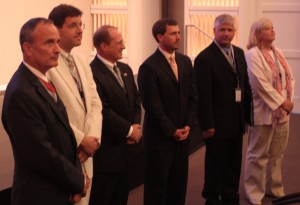WASHINGTON — Some American civilians who have been working in Afghanistan to ease the transition of power from U.S. forces to Afghans say local authorities are taking more control of their finances but a senior defense official said the U.S. transition effort should have begun earlier.
The U.S. Institute of Peace had a celebration Thursday to honor 17 U.S. civilians who spent one year in Afghanistan as part of the Ministry of Defense Advisers Program, helping train forces to ease the transition of power.

Civil Advisers are honored at the U.S. Institute of Peace Aug. 11, 2001 for their work in helping transition power to Afghanis. (Rema Rahman/MNS)
Michael Lumpkin, acting assistant secretary of defense, said, “One reality is that we came to the table late. We should have established something like MoDA years ago and, frankly, not just in Afghanistan but also in Iraq.”
The advisers spoke highly of the Afghans they trained to aid in the nation’s rebuilding and agreed that progress was being made through nonviolent avenues.
Advisers helped Afghans in areas such as financial management and defense organization, helping ease the transition of power when U.S. troops complete a drawdown in 2014.
“The basic purpose … is to move the Afghans steadily toward self-reliance,” said David Clifton, who was part of the first group to deploy last May. It’s important to realize that “civilians will have a very key role in making this happen.”
Clifton, who was chief adviser for development to the Afghan Ministry of the Interior, stressed the importance of acknowledging cultural differences when agreeing on how things should be done.
It’s critical to “think carefully about what’s the minimum requirement necessary for the Afghans to be able to run this function on their own in their own way which is often very different than ours,” he said.
A new class of advisers will deploy in September. That group will include some of the 17 honored Thursday who offered to return to Afghanistan to continue their work.
“A year is not enough time,” said Theresa Sorenson, who helped advise the Afghan defense department’s budgeting and finance. “It takes a while to get to know the Afghans and to get them to trust you.”
“We’re giving the Afghans more money to control,” Sorenson said. “We’re taking some of the money that we’ve been controlling and purchasing, and we’re now giving it to them — not all of it, just some of it, to see how they could handle it,” she said.
“We’re in a really critical part right now where we’re just starting to do that, so [I] want to see it through,” she said.
“Most of the ones that we deal with are honest … they want to do what’s best for their country,” Sorenson said.
